#other people’s meta
Explore tagged Tumblr posts
Text
There something so delicious about those ideas that just hit and sink so deeply into your subconscious.
Later, sometimes much later, you have cool thoughts and you wonder, was this something I already saw somewhere that just, like, melted into me?
#pretty sure i this is what happened with cas as slice and dice#and other cool things that melted into my brain#meta#other people’s meta
8 notes
·
View notes
Text
Shipping is fun and all but I swear every single time someone makes a comment, whether as a joke or in a legitimate analysis, about there being "no other explanation" for a pair's interactions, I lose just a bit more of my sanity
Like, no, you guys don't get it. Romance is not about the Amount of devotion, it's about the COLOR. the FLAVOR of it all. a character can be just as devoted to their platonic friend as they are to their romantic partner, and they don't love either of them more, just differently.
But because the majority of people still have it stuck in their minds that romance exists on the highest tier of love, I'm stuck seeing endless takes that boil down to "these two care about each other too much for it to NOT be romantic" as if that's the core determining factor to how literally any of this works
In conclusion: stop telling me that I don't understand the story if I don't interpret the leads as romantic, I am TIRED
#analysis#meta#miscellaneous#fandom#shipping#media discussion#amatonormativity#lgbtq#I feel like tagging any of the fandoms I was thinking of when writing this would be a little mean-spirited potentially#Disclaimer: no one has actually been telling me personally that I don't understand any story in particular#It's just that the way people tend to phrase their analyses feels unnecessarily targeted at the reader and that's just. not great#even if I agree with every other point they make
25K notes
·
View notes
Text
Reblogging because I love this addition and the point that Anne put the focus on “getting over” the grief aspect of trauma as much as the anger aspect.
Consent and Abuse in The Vampire Chronicles (and how it explains things like Daniel and Louis's disappearances)
TW: discussions of abuse, sexual abuse and rape, and CSA throughout this meta.
I’ve now read the first six Vampire Chronicles books, and I want to talk about the role that consent, or more importantly, the lack thereof, plays in the morality the books espouse. When I was a few books in, I discovered this post by @diasdelasombra, which uses excerpts from several scholarly texts to create a schema that helps us understand who Anne Rice considered a ��worthy” victim of abuse. To summarize, the characters that Anne favors and who are featured in the narrative were violated against their will, but don’t whine about their misfortune. Instead they extend grace and forgiveness to their abuser. (Think of David or Lestat) The characters who are portrayed as conniving, wicked, or who are punished by the narrative are those who don’t adequately protest their assault, or who harbor anger or plans of revenge towards their abuser (think of Claudia).
When I say abuse here, I am specifically talking about sexual abuse and rape, but also being turned into a vampire against your will. Being bitten by a vampire is obviously sexually coded, and being transformed into a fledgling vampire nonconsensually is a metaphor for a rape. So I’m going to spend this meta talking about nonconsensual turnings interchangeably with rape.
When I read about the dichotomy of victimhood detailed in the original post, the books suddenly shifted in my mind, and I felt like I understood Anne as a writer for the first time. I love these books and their resulting adaptations, but I do believe that Anne had many flawed beliefs, and this insistence that the only proper response to assault is complete and total forgiveness of the perpetrator is certainly one of them. I want to take the theory put forward by the original post one step further, and propose that in addition to imperfect victims, Anne also struggled to write about characters that engaged in sex/vampirism consensually. This feels very Catholic to me; you’re allowed to enjoy sex, but only if you didn’t ask for it. It’s the lust and the longing that’s sinful. It’s this discomfort with consensual desire, along with the insistence that victims must forgive their abusers, that is at the heart of many of the most frustrating aspects of the Vampire Chronicles. It also drives some of the conflict I see in the fandom, and has the potential to impact the TV adaptation in interesting ways. I talk about all of that in detail below the cut:
We can see this central belief about abuse and worthy victims easily in the characters Anne chooses to feature. Lestat, David, and Marius were all turned against their will, but crucially do not linger, protest, or whine once the act is done. Lestat is incapable of holding any kind of grudge, Marius approaches vampirism and eternity with calm stoicism, and David immediately forgives Lestat for turning him against his will.
I think this is key when we try to understand why Anne wanted to replace Louis with David as a companion for Lestat. Louis’s turning is complicated; you get the sense that he did consent to it, even as he tells Daniel that he “can’t say that [he] decided” to become a vampire. And even though he does forgive Lestat at the end of IwtV, the telling of the story in that book is filled with resentment and anger. Louis is not a perfect bastion of forgiveness by any means. Anne talked about how she wanted to move on from the grief that Louis represented and also the passivity he embodies as a character (which she classifies as uniquely feminine, which adds another dimension of meaning to who is allowed to consent to sexual acts and remain angry at abuse) but I also have to assume that she wanted to move on from his anger. Which is actually a huge disservice to Louis, Lestat, and the complexity of the narrative.
The other characters who are turned consensually are all abandoned by the narrative. Madeleine is killed, Gabrielle largely disappears after TVL, Nicki kills himself, and Daniel goes mad and is then simply forgotten.
My love of Daniel is the reason why I started stringing this theory together. Daniel is the most clear-cut case in the entire chronicles of a consenting adult who deeply desires to become a vampire. He has no reservations, no resistance. The Devil’s Minion chapter is unique in that it lingers on Daniel's love and desire. Daniel is briefly allowed to want something unabashedly that is also coded as sinful and evil. And once the consummation of his desire happens, Anne simply doesn’t know how to continue to writing him. Armand’s insistence that fledglings will come to hate their makers seems in some ways to be a result of Anne’s worldview, that desire cannot cannot endure unpunished, rather than something Armand would believe in-universe (he never hated Marius, after all). When fans rail at the way Daniel’s story seems to disappear from the page, this is what we are protesting: Daniel’s desire deserved to be shown, Daniel deserved to evolve, and Daniel’s willingness does not require rebuke.
There is of course another interpretation of the Devil’s Minion chapter, which is that it is Armand playing out his and Marius’s relationship, but this time with Armand in control. In some ways I think the Devil’s Minion chapter is the one successful attempt Anne makes to subvert the cycle of abuse. Yes, Armand is re-enacting many of the things done to him, but Daniel is happy to do this role play with him, at least for a while. While far from perfect, their relationship manages to turn abusive history into present day kink, and exist in a context of mutual care.
Armand himself is probably the most interesting edge case in terms of Anne’s dichotomy of worthy and unworthy victims. He asks to be turned into a vampire, but he’s also a child, which makes his ability to consent unclear. (Whether Anne even believed that child sexual abuse was possible at all is up for debate; she wrote a message on her “fan voice mail” that is still transcribed on her website that defends a convicted pedophile and seems to argue that 14 and 15 year olds are effectively adults and therefore cannot be abused. Yikes yikes yikes.) This kind of uncertainty seems to be reflected in the changing way Anne writes Armand throughout the series. He’s evil at first in the same way that Claudia is evil; a conniving forever child who is smart and vicious enough that what was done to him can be justified. But Anne softened on Armand after Queen of the Damned. As the series goes on, Armand comes to resemble Anne’s perfect victim more and more. He forgives Marius relatively quickly, for instance, for turning Benji and Sybelle without his consent.
For Marius (and Lestat) overcoming victim status also means becoming the abuser, the rapist, the perpetrator of the dark trick. The only way to not be trapped under the cycle of abuse is to perpetrate it. Even though it is hidden in a lot of language about love and forgiveness, this theme is ever present in the Chronicles and to me it’s where the true horror of the books lies.
We see these values begin to be applied to world building and the book’s overarching philosophy more and more as the series progresses. Akasha is the big bad in Queen of the Damned because she represents the ultimate lack of forgiveness. She is angry at all the men in the world for their collective abuses (a world view that seems to originate at least partially from the overly protective and restrictive way Enkil treats her, in my opinion) and seeks to kill them. She is an unquestioned evil, in a way that most characters aren’t in The Chronicles. And Maharet and Mekare, who are much more forgiving towards Khayman, one of the perpetrators of their own rape, are the ones able to defeat Akasha. Forgiveness and grace trumps righteous anger every time.
Memnoch the Devil is an interesting book (even if it is not a *good* one, imo) because it spends its pages interrogating this idea of abuse and forgiveness, but blows it up to a theological scale. Memnoch’s main argument with God is that he lets humans suffer needlessly. Memnoch feels that all that is good and holy amongst humans can be found in the way we love each other and find joy in sex, art, food, and celebration. But God requires humans to suffer through disease and death, and sometimes even violence brought about by religion. When Memnoch is put in charge of hell, he makes souls worthy of heaven by working on them until they are ready to forgive God for the suffering they had to endure during life. That’s what makes you worthy of heaven: forgiveness. I find this so interesting because it almost feels like Anne is arguing with herself over philosophy and religion. Memnoch is very convincing and his belief that joy without guilt is good is given due weight by the narrative. In some ways it’s what these books are about- sensual pleasure without guilt. But on the other hand, Memnoch is the devil (if that- Lestat is never quite sure if he’s really the devil or just a malignant spirit) which means we shouldn’t trust what he says. The idea of God as the ultimate abuser— the person who puts humanity through unspeakable horrors on a wide scale, and then requires our forgiveness in order to find peace— really chimes with the way that Anne writes about abuse in the rest of the series. According to this view, the cycle of abuse is absolutely inescapable. It is decreed by the almighty, and the only way to not be completely crushed by it is to accept its omnipresence and embrace its perpetrators without anger.
This focus on forgiveness is clearly a huge part of Anne’s (and therefore the vampires’) worldview, and I of course find that pretty problematic. But I also think it hurts the reader’s ability to connect to the characters and can have the unfortunate side effect of draining the books of the conflict needed to create a propulsive plot. The vampires’ inclination to completely forgive those who have wronged them, and to not linger at all in any feelings of anger, grief, or resentment, sometimes leads to baffling situations where conflicts that loom large in one book are completely forgotten in the next. The most jarring example of this to me is Armand casually playing chess with Santino in Queen of the Damned. Santino! The vampire who kidnapped him, forced him to eat his best friend, and generally tortured him. And they simply never address this. They just start playing a casual game of chess on Night Island after Akasha has been defeated. Situations like this can make character seem like they are acting completely out of character, and it makes it hard to understand their motives. Yes, there’s the in-universe explanation that time heals all wounds and eventually vampires just live long enough that they can’t hold any grudges. But I still think it’s reasonable to assume that Armand would hesitate before casually engaging with Santino again, no matter how long has passed. This kind of automatic forgiveness also means that we skip over so many conflicts that that would be fascinating to read about. If Armand and Santino really do need to reconcile, I want to see what that looks like. I want to see Armand remember Ricardo when he looks at Santino. I want to see what David and Lestat mending their relationship after Lestat’s violation looks like. But we don’t get any of that and instead the vampires move seamlessly on to something else, which is often much less interesting than these interpersonal conflicts that Anne ignores. And because of that, I think this focus on forgiveness creates books that are less fulfilling than they could be.
I think this focus on forgiveness is also at the heart of some of the conflict I see between book readers and show-only fans. I often see book readers talking about how Armand and Louis come back to each other later in the books, that Louis forgives Armand enough to live with him again for a time. And this makes sense in a book universe that prioritizes forgiveness above all else. In fact it actually signifies positive character growth for Louis, as it means he is becoming closer to Anne’s definition of a worthy victim who can forgive those who wronged him.
Fans of the show insist that the TV version of Louis will never forgive Armand, and for all I know they might be right. The TV show has shown that it’s very capable of taking the events and themes that Anne presented and reframing them. The show is already presenting a more critical depiction of CSA, in my opinion, by doing things like eliminating the incest subtext between Louis and Claudia and making it clear that Marius groomed Armand. I also think the show does a better job of keeping emotional stakes consistent. Louis may forgive Armand, but something more substantial than time passing will have to happen to facilitate that in the TV show. So show Louis may indeed never forgive Armand, given those new parameters.
In its efforts to reframe some of Anne’s themes, I believe the television show is shifting the emphasis on forgiveness slightly. Louis’s arc over the first two seasons depends on him reaching a state of forgiveness, not for an abuser, but for himself. He extends grace to Lestat as part of this process, but I really believe that the catharsis comes from Louis embracing his own failings and his own power, and moving forward with confidence. He has not forgotten his anger or the things that were taken from him, but he has the ability to face the rest of eternity now without self-recrimination. I imagine moving forward that this is going to be a major theme of the show. No matter if you sought vampirism out or had it thrust upon you, you must learn to how to deal with its horrors and its perks. You must learn to embrace your own monstrosity and not shrink from it. And you must find a way to accept the love that those around you are willing to offer, whether or not you always perfectly deserve it. I think these are lessons that Lestat, Armand, and even Daniel have yet to learn in the television show. Those character arcs are going to fuel the show through its coming seasons, and I for one cannot wait to see it unfold.
I’m interested to hear from other readers to see if they picked up on these themes, and how they anticipate the show will adapt them. Please tell me your thoughts! And thank you for reading this far.
260 notes
·
View notes
Text
"I've been waiting for ages for somebody to unmask them."

This moment tends to elicit negative reactions in a first read through, and I've got some opinions about why where Kabru is coming from here actually makes a lot of logical sense. So I thought I'd elaborate on that.
I think people hear this and go, "He thinks they must be hiding something because they gave money to someone? What a cynic." Or "he dislikes them because they did charity?? What's wrong with this guy!". And obviously, a lot, a lot is wrong with him. But I think this makes more sense than it seems at first glance! What people evaluating this judgement miss is why Kabru is paying attention to Laios and co to begin with.
Kabru knows of the Touden siblings because (he's a little bit of a stalker-) he is keeping an eye on all the relevant parties in events developing on the island, in order to be able to guide them to his preferred outcome. This includes adventurers because they are the ones actually exploring the dungeon! He's well aware that something as minor as internal tensions between party members could be key to the historical events that are developing. (He would love the assassination of Archduke Franz Ferdinand.)
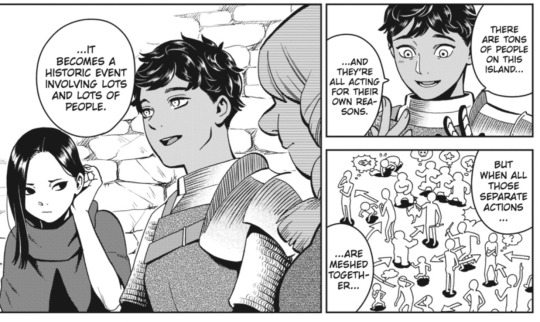
His desired outcome is that whatever the rewards are of breaking the dungeon's curse, whether that's kingship or the ancient elven secrets of dungeons, are claimed by:
A) a short lived person
B) Someone who will be a good, effective leader and/or use those secrets and the power they carry wisely, with foresight, and to establish a political bloc for short lived people.
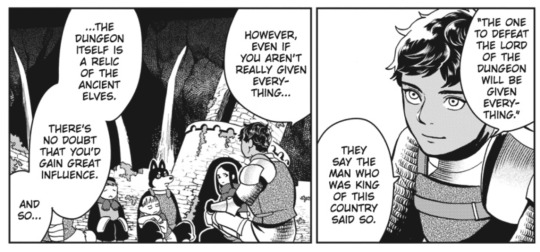
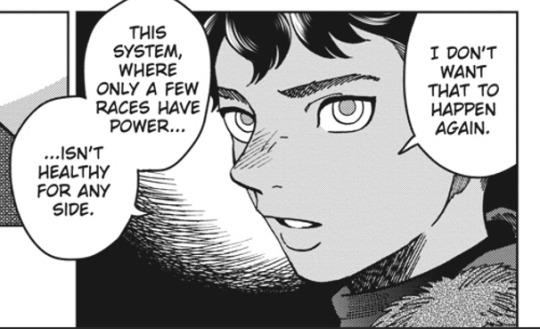
The person he can best trust to do this is, of course, himself. But due to his PTSD regarding dungeons and monsters, he's not able to develop the necessary skills to conquer the dungeon. Once he realises this, he starts looking for someone else who he can support to that end.
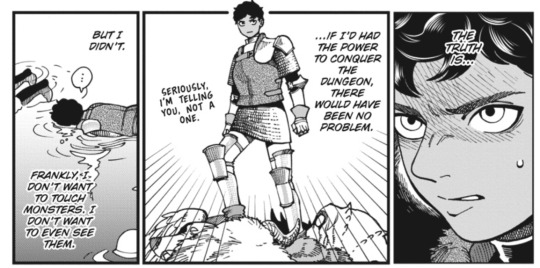
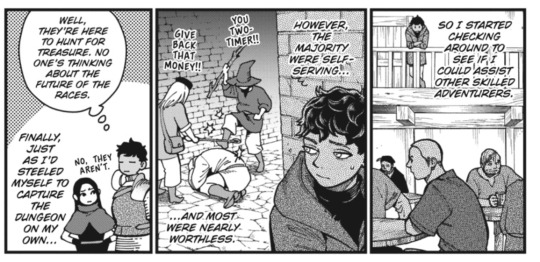
But most of the adventurers don't have any intentions of conquering the dungeon, don't have the skills, or are unsuitable in other ways. In fact, it seems like some potentially suitable people are the Toudens. There are a lot of good rumours about them going around - they actually seem to have a very positive reputation! That's what Kabru means when he says "unmask".

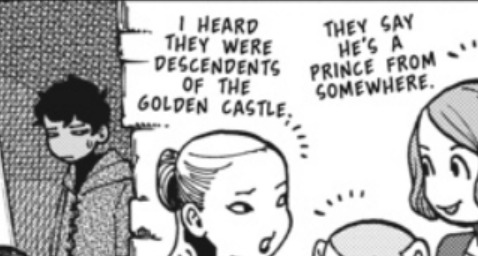

So when Kabru is observing something like them giving money to an old comrade from their gold-peeling days, he doesn't consider it a problem because "they're giving money to this person who doesn't actually need it" or because they must have some dark secret if they act superficially nice. I think he actually understands this situation and what it implies about Laios (in particular) perfectly well.
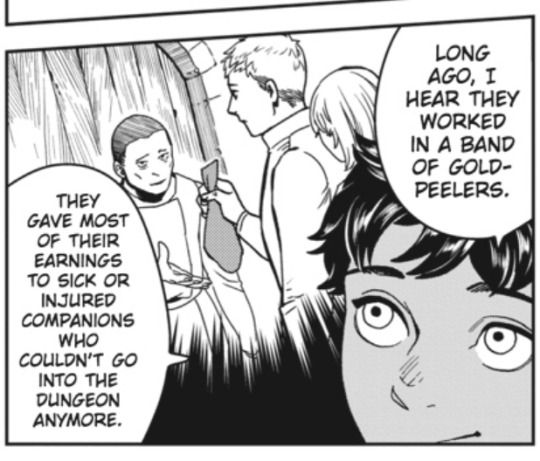
Laios and Falin gave money to an old comrade who got injured and couldn't work. That person then healed up but kept taking their money. Then he used the money to start smuggling illicit goods to the island.
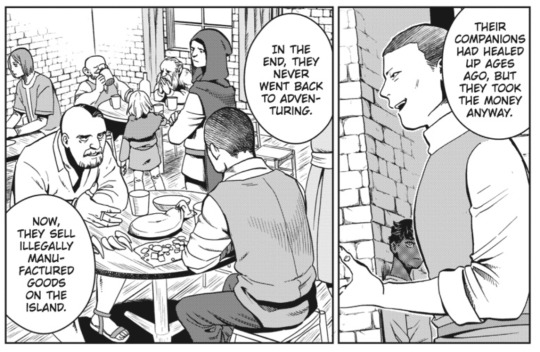
The key is that for Kabru, the problem here is the same as with the corpse retrievers - people using the dungeon's resources to fuel dangerous, selfish, or violent pursuits cause problems for the island, attract more criminals and people with motives other than breaking the curse, and increase the chances of the whole situation ending in tragedy.

Kabru is willing to work with the Shadow Lord of the island if it gets him to his goal - he isn't scrupulous - but the criminal element of the island increasing is something he sees as a major issue.
Also, when you're evaluating someone as a candidate for power, riches, secrets, potentially kingship - then being curious about how the money you give to people is going to be used is kind of a relevant trait!
Interpersonally, Kabru's actually very easygoing - I mean, Mickbell isn't exactly an upstanding guy, is he! But Kabru likes him and they get along well. These traits wouldn't be a problem at all in a friend, or a comrade, or someone Kabru was confident he could use. But he can't get a handle on Laios, and Laios is someone who has the potential to be a major player!
On Laios' end, this is the same as with the marriage seeker who joined their party. She kept asking for things and he gave them to her, because he tries to be nice to others. He even gives her money! It's the exact same thing.
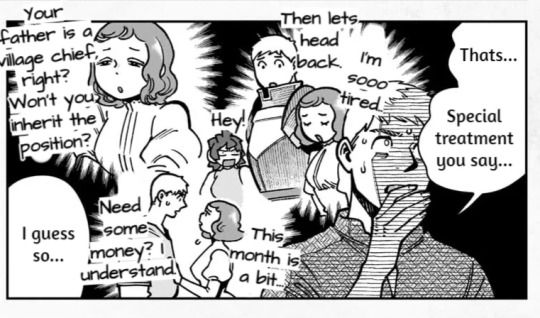
That's fine, but it became a problem because he basically wasn't interested in her motives, didn't notice she was trying to manipulate him, and it also didn't occur to him that the other party members would notice or be affected. We can assume the situation with the gold peeler is the same. When Kabru says that "It's not that they're bad people, they just aren't interested in humans," he isn't wrong.
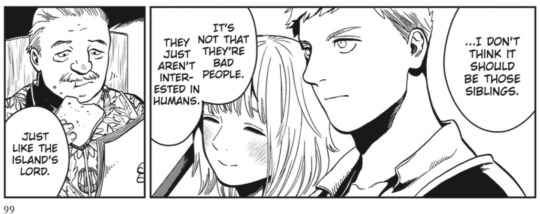
The extent to which this is true of Laios is linked to his autism imo, (because it isn't just disinterest - he genuinely isn't able to notice nonverbal cues that people are lying to him or have ulterior motives) but to a greater or lesser extent I think it's a very common trait. Most people aren't actually that interested in other people who aren't close to them. Kabru is the weird one here. It isn't an issue except as a leader - which is why we see an immediate comparison to the Island's Lord, because that's how Kabru is evaluating them.
And disinterest in/lack of ability with people to the extent Laios exhibits it, it does, actually, make him a worse leader... it's just that as we see in the story, people can help him out. The rest of the party tell him the marriage seeker is taking advantage of him so he tells her he can't give her special treatment anymore. They're pissed and it's a crisis point - he couldn't have recovered their trust without Marcille and Falin - but that's exactly the point. With Marcille and Falin, he was able to recover their trust.
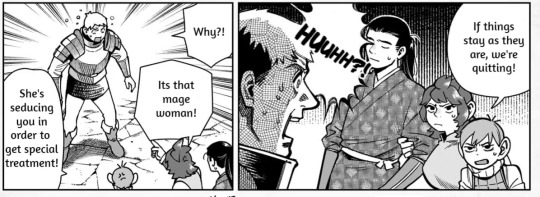
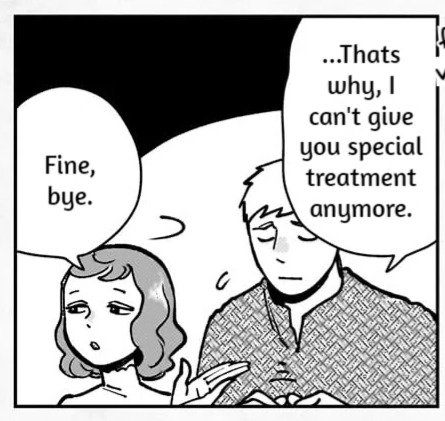
And he has other good traits that make up for it, such as his intelligence, strategic knowledge, open-mindedness and sense of fairplay.
Kabru doesn't disqualify Laios as a candidate based on what he sees about him from afar, though - he still tries very hard to get close to him, obviously hoping that if he manages he can steer Laios to defeat the dungeon and make up for his lack of people-skills in the aftermath. (Which... he does eventually achieve that goal!) He completely fails until the events of the story, so... definitely I think "They just aren't interested in humans" could also partially be a stung reaction to Laios' complete disinterest in him.
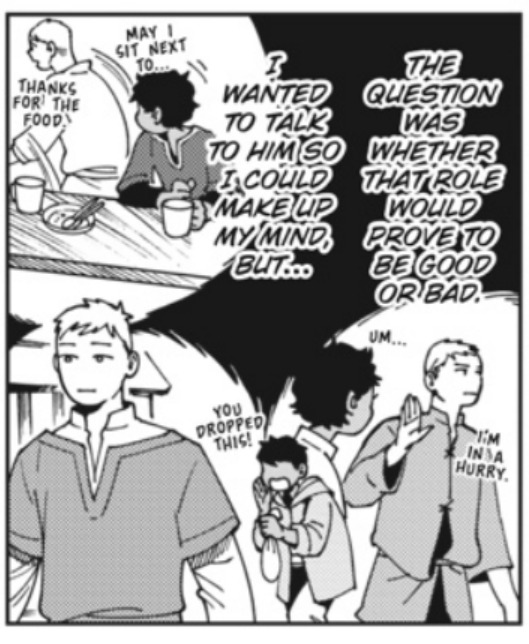
Anyway, that's my read on what exactly Kabru's "issue" with Laios is. Obviously, once he does find out what Laios' true nature is like - about his love for monsters - he develops an entirely new set of fears about Laios' priorities. But since Laios kept that a secret until the start of the story, he has no idea of that yet.
Given all that, I think it's interesting that he says that he doesn't think that the Toudens are suitable to defeat the dungeon, and that he's hoping they'll turn out to be the thieves. As some of his few potential candidates, people who he thinks may play a big role in the island's future, you'd think he'd hope they would be good people!
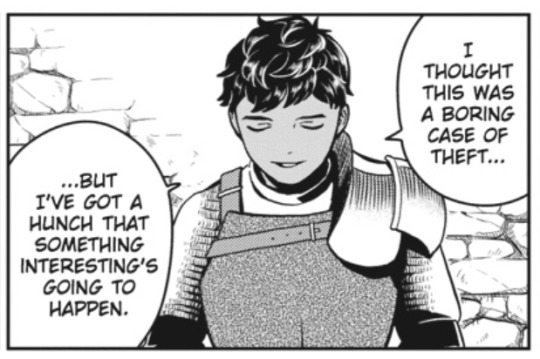
I suppose it's better, in his eyes, because it means that he's involved in something "interesting". They haven't just had their stuff stolen by regular criminals (boring, puts them further away from his goal) - they've been caught up in the beginning stages of "a historic event". The desperate and dwindling group forgetting morals in their quest to retrieve their lost comrade probably appeals to his sense of melodrama. Because he also just... loves drama.
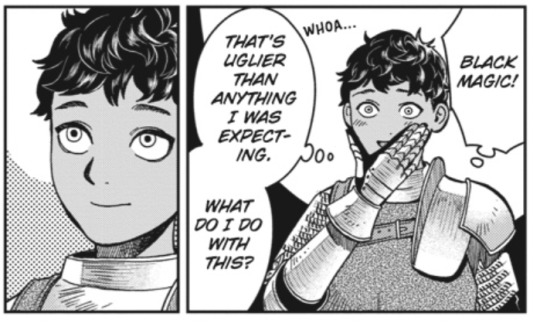
Despite it being "uglier than anything he was expecting", he still pursues Laios as the person he wants to conquer the dungeon pretty much as soon as it becomes clear that he won't be able to do it himself and they are out of time. That's because... well, to be fair, there aren't any other options. And he fits standard A: he's short-lived!
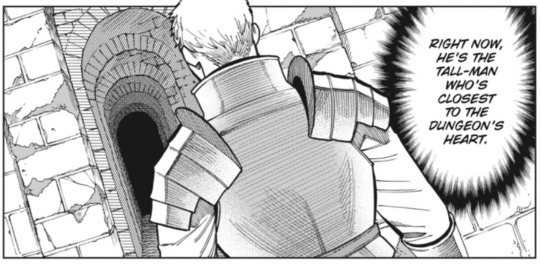
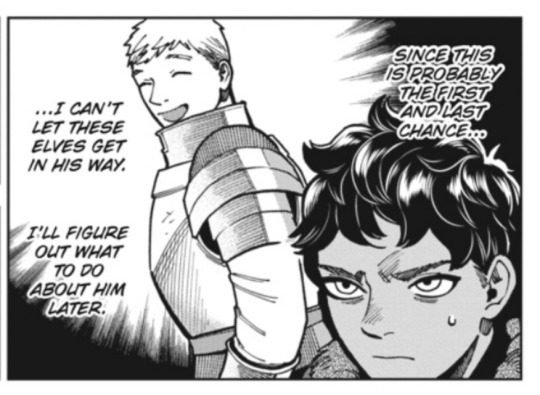
and Kabru still hopes he can fit standard B, too, and be persuaded to use the power he wins for good. No matter how many nightmares he has about Laios, or whether he thinks about killing him. He doubts him, but ultimately he puts his faith in him and seems happy after the manga's ending that he made the right decision.

#dungeon meshi#dungeon meshi manga spoilers#dungeon meshi meta#kabru of utaya#laios touden#labru#laios x kabru#dunmeshi#og post#kabru is such a big picture thinker. and he evaluates people more than he judges them imo#the hater jokes are funny but the people he judges most harshly arent laios and co. they're people like the island's lord.#but you don't see that as clearly because he isn't interested in the island's lord. he understands him. finds him contemptible but useful.#whereas laios lives in his brain rent free because he WANTS to understand him but doesnt quite.#even though he sees the elves as a major threat to his ultimate goals and dislikes the way they treat short lived races#he still understands and evaluates mithrun as an individual based on his own merits#he's one of the characters who is least judgemental in that sense because while he's always making judgements and evaluations#he's also constantly revising them whenever he gets more information#my beautiful machiavellian prince <3#it's genuinely a really laudable way of understanding others imo.#the only problem is that because he's driven towards his goals by his PTSD and survivors guilt#he pushes himself into situations (the dungeon and also interpersonally) that trigger him or even just upset him#without regard for what he authentically wants or his own wellbeing.
4K notes
·
View notes
Text
thinking about the way ghost doesn't hesitate to start killing shadows when graves betrays them but soap only takes one hostage
you can almost hear the voice in his head telling him it doesn't have to be this way; they can still talk it out
"i'm calling shepherd"
his first instinct when confronted with betrayal is to play it by the books: to go up the chain. that goes against everything we've seen him do. he bucks authority at every chance except for the one time he's confronted with the barrels of his allies' guns
he wants a peaceful resolution; for the first time we've ever seen, he doesn't want violence to be the answer. there has to be another fix, a solution that doesn't end with him killing the same men he's been working with; his friends
nothing's happened yet
it doesn't have to go this way
but ghost has been betrayed before. he knows the way this ends; either with him six feet under or his enemy
he doesn't hesitate
it's only when they knock alejandro out that soap shoots; when they spill the first blood and cross a line they can never come back from
only when ghost orders him to run and he has to cover his retreat
and somewhere along the line, between civilians’ screams and taunting voices, between his shaking breath and ghost steady in his ear, that naivety is stripped away; his trust turned to teeth that he uses to sink into throats of men he'd have given his life for
"be careful who you trust, sergeant; people you know can hurt you the most"
he's learned the price of trust
just like ghost did
but unlike ghost, he has someone to guide him through the aftermath
"good advice, It"
#im gonna add these to my notfics on ao3 i think i have a Lot of these floating around#a bit shorter than my other metas but i think its something that gets missed when people talk about alone#soap is a violent man#his career literally trains him to shoot first ask questions later#and yet he still tries his best to avoid blood when faced with betrayal#and you realise it actually does fit him#soap cares about the men he serves with#he wants to save the men at the crash site he checks on a downed soldier he asks about civilians about alejandros family#hes very tuned into the people around him#and he cant turn that off until hes forced to#until graves gives him a reason to hate him#and all of that previous care and consideration goes out the window#‘makes me want to commit a few war crimes of my own’#dont cross soap#you want like what happens if you do#coming out of my cage and ive been doing just fine.txt#we’re a team. ghost team#talk meta to me#soap cod#john soap mactavish#ghost cod#simon ghost riley#ghoap#ghostsoap#soapghost#meta#phillip graves#graves cod#save post
2K notes
·
View notes
Text
something about how garak and julian both lead with their worst foot forward as the first impression.
which is why The Wire works so well for them, because it’s both of them on full display in a way that forces them both to accept they either like each other at their most infuriating or they don’t. and turns out, they do like each other, even when they’re both being incredibly aggravating to each other.
julian contends with the reality that garak has likely killed and tortured countless innocent people, will likely never be truly honest with julian about anything ever, and that he can be incredibly venomous and cruel at his worst, and julian decides he still cares about garak and will still be his friend in the aftermath.
garak gets to see how impossibly stubborn and reckless julian can be, how frustratingly dedicated to his ideals of looking after other people he is, how utterly annoying julian can be when he’s got his mind set on something… and garak absolutely walks away deciding these are also julian’s best traits, even if garak thinks they might need tempering for julian’s own good.
they don’t actively consider each other proper friends until they have been forced to look at the parts of each other they might find most off-putting, and they both see that and go “… yeah, i still like him, even more now actually.”
idk there’s something about how they find themselves endeared to each other for the exact same traits that would normally drive others away. they fall in love with the whole picture right from the start. of course, julian can joke about garak having murdered people. he knew that from the word go and decided he liked garak anyway. of course, garak falls deeper in love with julian when he demonstrates his near-suicidal levels of dedication to protecting others, that determination was what sparked garak falling in love to start with.
and they can still dislike parts of that whole, garak definitely wishes julian would be more selfish (for the sake of self-preservation, mostly), and julian doesn’t exactly *approve* of garak doing morally reprehensible things, but… they knew exactly who they were falling in love with and went all in anyway.
something about falling in love with someone from their worst parts so that every time you have to reassess your view of them, it only makes them more lovable.
#star trek#star trek ds9#garashir#julian bashir#elim garak#.is this coherent i can’t tell.#.i think it kinda circles.#.i am using worst in a very subjective way bc idk how else to phrase this.#.it’s like. the traits that would make most people walk away.#.but it just makes these two run at each other full speed instead.#.i mean also julian does clearly have some weird specific kink for garak doing awful things.#.but idk if julian knows that himself.#.like he seems like he WANTS to be put off by learning garak did terrible things and then he just isn’t.#.anyway i love them both.#.happy new year folks.#trek meta
670 notes
·
View notes
Text
This is the kind of Fëanorian apologetics that I need in my life! And also a great demonstration of how overwhelming the power of the Ñoldor was when they came forth from Valinor.
The amount of times I've seen the Dagor-nuin-Giliath misconstrued as a defeat, or "first sign" of the inevitable failure for the Fëanorians is just baffling if you consider the actual events.
But the host of Morgoth, aroused by the tumult of Lammoth and the light of the burning at Losgar, came through the passes of Ered Wethrin, the Mountains of Shadow, and assailed Fëanor on a sudden, before his camp was full-wrought or put in defence; and there on the grey fields of Mithrim was fought the Second Battle in the Wars of Beleriand. Dagor-nuin-Giliath it is named, the Battle-under-Stars, for the Moon had not yet risen; and it is renowned in song. The Noldor, outnumbered and taken at unawares, were yet swiftly victorious; for the light of Aman was not yet dimmed in their eyes, and they were strong and swift, and deadly in anger, and their swords were long and terrible. The Orcs fled before them, and they were driven forth from Mithrim with great slaughter, and hunted over the Mountains of Shadow into the great plain of Ard-galen, that lay northward of Dorthonion. There the armies of Morgoth that had passed south into the Vale of Sirion and beleaguered Círdan in the Havens of the Falas came up to their aid, and were caught in their ruin. For Celegorm, Fëanor’s son, having news of them, waylaid them with a part of the Elven-host, and coming down upon them out of the hills near Eithel Sirion drove them into the Fen of Serech. Evil indeed were the tidings that came at last to Angband, and Morgoth was dismayed. Ten days that battle lasted, and from it returned of all the hosts that he had prepared for the conquest of Beleriand no more than a handful of leaves.
-The Silmarillion, Chapter 13: OF THE RETURN OF THE NOLDOR
The Battle was a victory, not only barely eeked out but an utter eradication of Morgoth's armies. Not only the forces specifically marshalled against the arriving Noldor (what seems to be a reconstructed eastern host, with the last one mostly destroyed in the First Battle) but also Morgoth's initial western host occupied besieging Círdan and people, that had to be diverted for attempted reinforcement. Which the Fëanorians quickly shatter without issue, despite having to divide their forces. Something important for me to bring up because you'll often see the argument that the Fëanorians doomed themselves by cutting of the Nolo-and Arafinwëan manpower, which both ignores how Nolofinwë at the time was actively disputing Fëanor's leadership and therefore would not necessarily have led to an effective united front (with the implied 'solution' mostly boiling down to "Fëanor should have let Nolofinwë usurp his kingship because he would have made a better king anyway" and never "maybe Nolofinwë should have stopped agitating against the guy who was rightful king by all procedures of inheritance we ever see (and Fingolfin himself would adopt) to get himself crowned as his first priority"), as well as how even just the Fëanorians alone completely curbstomped the forces of Morgoth that had previously scattered the Laiquendi, confined Thingol to Doriath and besieged Cirdan. Sure, eventually they would have likely been overwhelmed by the unending stream of new armies, but that's exactly the same thing that eventually happens in canon anyway, even with the rest of the exiles present. Trying to argue that the Dagor-nuin-Giliath in particular already demonstrates the certainty of the Noldor's defeat is nonsensical.
It was "renown in song"! And given that this is mentioned in context of the victory it was, it feels safe to say the renown in question was of celebratory nature (as opposed to the often celebrated Fingolfin duel, which in-universe is explicitly described as thus: "The Orcs made no boast of that duel at the gate; neither do the Elves sing of it, for their sorrow is too deep."). Given how sparse the details and hints we get towards the Fëanorians and east Beleriand side of things can be, the vast majority of it in implications or one-liners (such as most of their alliances and friendships) and after-the fact admissions ("bereft of their power and glory of old" being the most prominent one that comes to mind), this just makes me very happy. Also disappointed-but-not-surprised how often it goes ignored or straight-up inverted. No doubt in large part due to the following:
Thus it was that he [Fëanor] drew far ahead of the van of his host; and seeing this the servants of Morgoth turned to bay, and there issued from Angband Balrogs to aid them. There upon the confines of Dor Daedeloth, the land of Morgoth, Fëanor was surrounded, with few friends about him. Long he fought on, and undismayed, though he was wrapped in fire and wounded with many wounds; but at the last he was smitten to the ground by Gothmog, Lord of Balrogs, whom Ecthelion after slew in Gondolin. There he would have perished, had not his sons in that moment come up with force to his aid; and the Balrogs left him, and departed to Angband.
First up, any and all attempts to try and paint this as a pathetic end are straight-up ludicrous (especially for people who are impressed by Fingolfin's duel with Morgoth later on). Fëanor in this is not only taking on a variety of Balrogs but also what seems like the remnants of the eastern host that his forces had hunted into Ard-Galen in the previous section (once they notice his separation from his army they turn from flight back towards him; the Balrogs are even specifically noted to "aid" them!). And he's doing it. By. Himself. Not only that, putting up a long and fierce resistance against multiple Balrogs (compare this to Fingon in the Nirnaeth, who gets quickly tripped up by two of them).
The Balrogs are always depicted as Morgoths elite troops, their last appearance in the story having been to drive off the empowered Ungoliant:
But Ungoliant had grown great, and he less by the power that had gone out of him; and she rose against him, and her cloud closed about him, and she enmeshed him in a web of clinging thongs to strangle him. Then Morgoth sent forth a terrible cry, that echoed in the mountains. [...] The cry of Morgoth in that hour was the greatest and most dreadful that was ever heard in the northern world; the mountains shook, and the earth trembled, and rocks were riven asunder. Deep in forgotten places that cry was heard. Far beneath the ruined halls of Angband, in vaults to which the Valar in the haste of their assault had not descended, Balrogs lurked still, awaiting ever the return of their Lord; and now swiftly they arose, and passing over Hithlum they came to Lammoth as a tempest of fire. With their whips of flame they smote asunder the webs of Ungoliant, and she quailed, and turned to flight, belching black vapours to cover her[...]. -The Silmarillion, Chapter 9: OF THE FLIGHT OF THE NOLDOR
(Though I'll grant that there might have been less Balrogs present in the battle against Fëanor)
I'll also point out that the Balrogs retreat the moment the rest of the Fëanorian host and sons arrive as reinforcement, indicating they were not confident in their chances to take them on (otherwise why not take this chance to destroy your enemies once and for all, before they can properly encamp and establish themselves?), which seems reasonably, given the extended struggle even Fëanor alone put up against them (to the point that despite drawing "far ahead" of his van, said van caught up in time to prevent the last of it).
So, obviously the death of their father and king still would have been a heavy blow, far be it from me to deny this (despite the stories refusal to give us any details on the emotional impact of it...), but I reject the notion that it turned the battle into a net "loss", especially if you keep in mind the unusual circumstances of it that are already kind of separated from the battle proper. Which leads into my last point, no longer about the battle itself but still relevant:
Then his sons raised up their father and bore him back towards Mithrim. But as they drew near to Eithel Sirion and were upon the upward path to the pass over the mountains, Fëanor bade them halt; for his wounds were mortal, and he knew that his hour was come. And looking out from the slopes of Ered Wethrin with his last sight he beheld far off the peaks of Thangorodrim, mightiest of the towers of Middle-earth, and knew with the foreknowledge of death that no power of the Noldor would ever overthrow them; but he cursed the name of Morgoth thrice, and laid it upon his sons to hold to their oath, and to avenge their father. -The Silmarillion, Chapter 13: OF THE RETURN OF THE NOLDOR
Even if you are a fervent believer in the fact that Fëanor truly had a clear revelation about the future somehow (at the very least in part because you prefer the omniscient narrator to the in-universe chroniclers, I presume), even if you believe he, dying, would have known this epiphany for what it was: in-universe this would have been ludicrous to assume and incongruent with the very recent lived experience of him and his people. The Fëanorians, it bears repeating, just won a crushing victory against Morgoths forces, which they near obliterated, and even his most elite soldiers fled before them, the only notable casualty occuring due to singular circumstances (which fandom is not slow to point out when it comes to more humoristic purposes). There is literally NO rational reason for the Fëanorians, and indeed, Fëanor himself, to see their cause as doomed based on their experiences with Morgoth and his forces! So even if Fëanor truly gained this "foreknowledge", why should he have heeded it? The guy laughted in the face and threats of his worlds angels! These characters do not know they are in a story about fate and doom without recurse from either, and are determined to fight against such forces whenever they are presented or threatened with them. So the argument I see that uses this as another ammunition why "Fëanor sucked and was a bad dad!" (his sons are literally men grown...) because he urged his sons to remain committed to a cause he "knew was doomed" just ignores everything about recent events and the Fëanorian mindset and determination.
Since it's one of my greatest gripes, I also have to once again ask: where, in this, do people see this infamous "second oath" (which...wouldn't that make Celegorm's recital of it in Nargothrond a "Third Oath"? Yet I've never seen that argument, funny that) ?
(I also disagree with the occasional choice to present Maedhros' capture as somehow still part of it, which it very much is not, however close to the battle's conclusion it might have happened, since the concession of defeat by Morgoth's embassy necessitates for that battle to be regarded as concluded by both parties imo. I'd also argue that the Fëanorians took some time to recover from the ten day battle and fresh grief of loosing their father, as well as time to debate the offer for a few days at the least, something which Maedhros needing to convince his brothers of his idea kind of implies, nevermind the other practicalities of it, such as agreeing upon the place for negotiations and numbers of troops allowed (which both sides break, but would still have been negotiated) with Morgoth's embassy, which would have taken additional time. Which is not even mentioning Maedhros potential coronation. But that's neither here nor there...)
#silm#fëanor#dagor-nuin-giliath#fëanorians#silmarillion#battle-under-stars#other people’s meta#silm meta
60 notes
·
View notes
Text
thinking about not only the specific people lucanis pulls in to represent the 'locks' in his psyche, but the storytelling that happens in the structure/order of them. the underlying ideas are presented something like:
the lucanis who went into the ossuary never came back out again; he died down there (the boy caterina raised is gone forever) -> you're putting yourself in danger doing this (by being close to me), you should leave because I can't bear it if you get hurt because of me -> it doesn't matter even if we do try this, it won't work anyway (again because of me) ('you know what he's like, you can open the door but he won't walk through it' :'( oofie doofie) -> what if the real secret is that there was never anything but the monster in here from the beginning. you should leave, there was never anything here worth saving in the first place. (implicitly: what if I deserved what happened, all along.)
it runs pretty cleanly from outward-oriented attachment anxiety ('caterina won't even want me back like this, she won't recognize me (the same way I no longer recognize myself)) and gradually deeper inwards until we reach self-image and self worth. or you know, the harrowing basic lack of it lol.
"careful -- they'll know we're not right," spite says in one of their first scenes... but clearly, some very deep part of lucanis has feared or suspected for much longer than that that there's something inherently not right at the core of him, way before any demon entered the picture. and the voice he gives those lines to is the person who should know him better than anyone in the world, who he has loved more than anyone in the world -- and who deliberately chose to hurt him so horrifically anyway. 'It's better if I'm just a monster and deserved what happened than it is to allow for the idea that the brother I love doesn't really exist and maybe never did'. it's better if he's fundamentally flawed in some way that needed fixing to help him survive, and that's why caterina chose to hurt him again and again -- out of love. (this one I think he might have a very sad wakeup call on one day if he ever ends up with the responsibility and care of a child of his own in some way and realizes just how alien the idea of ever intentionally hurting them for any reason is to him. oh buddy. also interesting that he keeps caterina as the outermost lock -- there IS a distance he keeps there that he hasn't with illario. he doesn't resent her 'anymore' he says, but he also keeps her carefully further away from his deepest self.)
as far as I could tell the only note in the mind prison that's fully hidden and needs to be uncovered is the sad painful helpless stupid little truth that even after all this, even knowing what happened... he still loves his brother. is there anything illario could ever do that would make lucanis completely stop loving him, do you think? sometimes the trouble with unconditional love is that it is, well. unconditional, even when some terms and conditions probably would have been in order haha.
that's the pattern you see there again and again; he would rather destroy and abandon and imprison himself at every turn than let go of love, even when it's just scraps, even when there's only ever enough of it to hurt him. it's only when rook shows up and as it were takes his hand and walks along with him that he can entertain the idea of changing the story of what walking out the door might mean in the end.
#tl;dr the demon is a metaphor about dissociation and trauma and it's doing its job thematically fucking pitch perfectly that way the end#dragon age#dragon age: the veilguard#dragon age: the veilguard spoilers#dragon age spoilers#lucanis dellamorte#dragon age meta#this mission is like ds9 the wire in terms of episodes you really can examine from a thousand different angles#and find something new and soulcrushingly sad every time. exactly my kind of episode in other words#whenever people say there's nothing to him but coffee and spite jokes some small part of me goes 'oh I'm so incredibly sorry!#it must be really hard and so impractical to go through life without being able to read :'( get better soon'#is that very nice of me. perhaps not. is the writing here *perfect*? of course not. but some people are also dedicated to being#wilfully blind (presumably b/c they would have preferred to see something else?? idk man)#lucanis' reaction to taash going 'I'm sorry I'm such a bad crow :'('... he could NEVER do what caterina did with him no matter what#you just can't use him like that. he needs the clean family/enemy/contract distinction or you just break him!!!#caterina literally what are you thinking. every day I ask myself this. (probably 'the only other option that keeps the seat in the family#is illario. so that's right out of course' lmao)#god forbid it happen anytime soon if it should happen b/c there's Stuff that needs working through first lol but he'd be such a soft dad
674 notes
·
View notes
Text
Prompt 318
Danny is learning how to shapeshift. It’s fun, really, and he honestly thinks it’s more than a little cool. Plus it’s not a learn or you fully die sort of thing, which is pretty cool too. He just erm, might’ve also made a mistake. A little oopsie. An uh-oh.
Erm. So. Apparently stuff stays when you go from ghost to human form. Just erm. More… permanent? Look he panicked, okay! And it wouldn’t have been that bad if not for the fact erm… his friends might’ve done it too…?
Okay, okay, this is fine erm. Oh hi Mom, Dad I- O-oh yeah! D-definitely! Psst, Tucker, what’s a meta…? Oh. Okay yeah- wait can they use this to avoid the GIW thing? They definitely could, right? Like they definitely can- Sam we need the corkboard!
Er. And inform their parents too… even if it’s more than a little obvious. Maybe they shouldn’t have been trying to mix and match…

#DCxDP#DPxDC#Prompts#My art#Halfa Trio#Team Feline Au#Nekomata Sam#Sphinx Tucker#Griffin Danny#”Excuse me we’re not ghosts we’re metas thanks >:/”#The rest of the class might go a bit wild over the loser trio apparently being metas now#They post so many pictures- not that the trio is aware at first#Tucker is the first to find out & realizes they can Use This#Look me in the eyes and tell me the internet WOULDN’T go wild over trio of cat people#They weren’t expecting any of this#The moment they ever go to another city the local hero who goes online is zeroing in#Why yes the trio snuggle up together in a purring pile on the bus#Also yes they do go to Frostbite & other not-so human looking ghosts for help with clothing#And shoes for paws#space core danny#storm core tucker#life core sam#ironic with what nekomata are associated with
1K notes
·
View notes
Text
Been thinking about how Bill legitimately had a horrifying reason (the literal progressive disintegration of the nightmare realm that erases whatever it disintegrates from existence completely) to move himself and his crew into a new dimension. Like that's terrifying. And yet he never utilizes this to his favour. He could have been honest about this with Ford, and you KNOW as long as Bill didn't mention plans of overtaking the earth, Ford would've made the portal for him, both out of Ford's own interest and because Ford when faced with these big moral questions will pull through. But this is a card Bill NEVER plays because although he needs to leave the dimension, he cannot lose face. He can't put aside his pride and admit to the humility that he needs to flee from his dimension, that he's not actually all powerful. And so instead he pretends to be a muse and when Ford figures out something else is going on, instead of being open and humble and saying that his dimension is unravelling, Bill focuses on that he's going to over take earth, that he's actually been a monster all along, surprise Ford!
And part of it is definitely because Bill's built himself up on power and violence and to grovel and earnestly ask for help, to admit that he cannot stop the unraveling of his dimension completely invalidates that; showing vulnerability? Can't do that, even under the guise of lying to get his way. And part of it makes you wonder if it's also a form of self-sabotage, because underneath his deep denial Bill is guilty over what he occurred; he sees himself as a monster and so he'll be that monster, and having people recognize that feels good in the same way that pressing a bruise feels good. But it makes you wonder what would've happened if Bill even just was open about his dimension unravelling and had lied about overtaking the earth.
It's also interesting because although Bill has SOME charisma and can manipulate people decently well (as evidenced by his cult, and pandering to people's desires with Ford, Mabel and Blendin), he refuses to be vulnerable, refuses to not be true to his off-putting self, even when if he was just vulnerable of pretended to not be himself, to put aside the (false) pride he has in himself he would've gotten a portal by now. and part of me wonders if it's because it's this false pride that built on insecurity and denial on who he is he cannot drop that mask.
Further thoughts on this!
#hugin rambles#hugin rambles gf#uhhhh yeah anyways Bills a delightfully complex character#and I think thats why also Bill fell hard for Ford is because Ford was vulnerable with Bill and actually CARED for Bill and got to peer#into the vulnerable bits of Bill and cared for him#but yeah fascinating. rotating him in my head whooo#bill cipher#billford#the book of bill#TBOB#gravity falls#but seriously the idea of Bill becoming honest with Ford instead of being like HAHA I TRICKED YOU bounces around the ol noodle with vigor#like dude thats a HUGELY typical self sabotage thing. like why YES im what people think i am.#hes interesting because hes good at manipulation. but also at the same time bad at it because he refuses to not be himself.#which... yanno i can respect. truth to being yourself even if thats offputting and annoying. but certainly makes it more difficult#re: manipulation. and then there was ford who was just. really into Bill in entirety#congrats! you guys match each others freak and toxic neediness to the t#gravity falls meta
913 notes
·
View notes
Text

(— @bookdork1 )
“The writers wrote this DeanCas scene / this queer Dean moment and then still called us delusional.”
No, they didn’t. But I’m sure as fuck calling you delusional right now for repeating this completely fabricated bullshit for the past decade without once stopping to wonder “but wait, which writer said that and when?”
Because if any of you had ever bothered to do that you’d realize that not a single one of the 52 credited writers of spn has EVER said anything remotely close to this.
Several writers have, in fact, said the opposite–and feel free to do your own homework on that, because the receipts are out there, and maybe if you dig them up yourselves you might actually pay attention–but people have been projecting and playing fandom telephone for so long that baseless bronly quotes have been falsely attributed to the people who were actively and deliberately writing this stuff into the bones of the show for years, and who eventually made it as canon as they possibly could within the confines of the network’s grip on a dinosaur Bush-era TV show.
I swear this take was exhausting to see continually crop up when the show was still airing, and I’ve gotta say it’s even more exhausting now because THE WRITERS UNEQUIVOCALLY WROTE IT INTO THE TEXT OF THE SHOW. AND THEY STILL HAVE NOT ONCE SAID THAT WE WERE DELUSIONAL FOR SEEING WHAT THEY PUT THERE.
For crying out loud the core emotional arc of the final goddamn season was Dean and Castiel’s relationship.
Castiel flat out confessed his romantic love for Dean in a scene that was written first thing in the season, that was built toward with deliberate intent for multiple years. Through that confession the show retroactively confirmed that all of the subtext and parallels and on and on that meta writers had been pointing out for years was in fact exactly what we thought it was.
So unless you think that somehow we managed to be spot-on correct about everything on Cas’ side but forgot how to interpret layers of text on Dean’s side, you should be able to understand that we were given two equations and one answer.
1 + 1 = 2 is what they gave us for Castiel.
1 + 1 = ? is what they gave us for Dean.
If you think they did it by accident you’re kidding yourself. If you think they left Dean’s answer as a question mark for some malicious reason you’re kidding yourself. If you think that “the writers” think we’re deluded for reading into all the layers the deliberately included in the story then you’re kidding yourself.
Quit uncritically spreading anti trash around like it’s truth.
#felt like RT-ing THIS because REMINDER#seriously all of this#2024 and bibros are out there still trying to change what happened lmao#destiel#the greatest love story ever told#favorite#other people’s meta#ish#tw bibros#ALL OF THIS.#narrative#supernatural#spn#and by intrinsic association this also includes ALL the bi!Dean stuff that corporate loves to water down and or ignore#since Day 1. Season 1. Bi!Dean existed already. The intent was ALWAYS there#so imagine how much more ‘subtextual’ shit was cut out of final reels pre/post production#wank for ts#cas is in love with dean#meta writers saw what the Writers wanted us to see#meta writers are not a monolith btw—I’m of the party that Deancas was intended as endgame since S4 (obviously)#and that endgame became so much more fucking apparent via the infamous Berens-Edlund-Dabb shift of Season 8 and beyond#like it’s literally INSANE
172 notes
·
View notes
Text
ok. years have passed and we've had some distance, so i'm finally gonna take the leap of faith that tma fandom is finally ready to hear me on this. let's talk about tannins.
161 was the first tma episode i heard on early release, and i felt the bit where martin declines wine and cites tannins was pretty obvious in its implications. cool, got it, say no more.
imagine my surprise when i was one of maybe three people i saw read between the lines there, in a fandom famous for red stringing--a fandom that immediately caught the much less obvious thread of ignition sources in the same episode. i'll spell it out: alcohol is an issue for martin.
maybe it just felt obvious because addiction is a pet issue for me--as it is for jonny, who has said everything he writes is filtered through a lens of addiction. i don't know if that's due to his own experience or a loved one's, and i won't speculate; i also don't know if martin personally struggled with drinking or just avoids it for fear he would, but alcohol would fit what we know of his family. his dad walking out and his mum spiralling into bitter wallowing and verbal abuse? i'd bet one or both of them drank, yeah.
on a basic level martin tries to decline alcohol, and that alone should have raised eyebrows given what we know of martin and, again, a fandom that dissects everything. we already knew martin "K" blackwood lied about his personal life and his family in particular, especially pre-canon, which is when this flashback took place. i was shocked that everyone took his flimsy excuse at face value with no further questions.
and the excuse is flimsy. martin turns down wine by--nervously--exclaiming tannins are "a proven headache trigger!" which sounds like trivia from a magazine cover and not the words of someone who actually has headaches--and it hasn't come up before or since. jon, confused, points out that tea, a drink martin consumes to a degree that is memetic both in- and out-of-universe, also contains tannins, and martin squawks a panicked, "what?!"
if tannins are enough of a concern for martin that he knew they're in wine and so avoids it, why didn't he know they're in his drink of choice? why does he still drink tea at the time of canon, and why doesn't he struggle with constant headaches from consuming 'a proven headache trigger' day in and day out? why, indeed, would someone avoid wine and not tea?
when sasha insists martin drink he caves and agrees to 'just a drop'. i imagine him pouring it in a plant, which admittedly he could have done if tannins really were the issue. i will say that i, for one, would be less likely to falsely agree to something that makes me physically ill than to a private issue that i'd rather not be pressed on any further. this scene also establishes martin's birthday was an ice cream party instead of the more traditional visit to a pub.
also, this scene was in the first episode of the final season, as one of three flashbacks that could have been to any pre-canon event in the archives. prime narrative real estate. not really time one would waste on establishing the important character context that martin has... headaches. which never comes up before or after, even regarding the week he spent in spiral town. but you know what is pretty crucial character background...?
it felt like a no-brainer, and yet all i saw was h/c fluff about jon attending to martin's headaches. and i hate feeling bitter about disability representation. i want folks with chronic headaches to feel seen and have fluffy escapist fantasies. i don't want to be mad about people portraying a character with a disability. but, guys? you got the wrong disability. jonny sent a clear message, and it went over fandom's head.
#martin blackwood#tma#the magnus archives#tma meta#the magnus archives meta#tma 161#mag161#sage speaks#sage original post#meta#im sure others caught it that i didnt see but listen. i was DEEP in the fandom. people getting it made up maybe 1% of the response i saw#and i had people fighting me for saying it#alcohol cw#alcoholism cw#addiction cw#greatest hits#wonderful news: tma fandom WAS ready to hear me say this!
2K notes
·
View notes
Text
people who act like batman isn't "judge jury and executioner" because he doesn't kill people are like. genuinely so funny to me because. they're very obviously thinking of "executioner" as like. the stereotypical guy with axe who chops people heads off, and not, yknow, the literal definition of the idiom itself, which is about someone who has the ability to judge and then subsequently punish someone unilaterally. which is quite literally what batman does.
he has the ability to decide what is a "crime" to him, he is the one who decides whether people are guilty of those crimes, and he is the one who executes their punishment. the severity of the punishment doesn't matter - he is unaccountable to anyone else, and indeed is allowed to commit as many crimes as needed to reach his arbitrary ideal of "justice."
the ideal of batman is this: a man who is so fundamentally changed by an act of senseless violence that he takes it upon himself to fight back against the rot and corruption in the world. he does this not through political activism, not through ridding himself of his wealth in favor of a greater good, not through community outreach, but through an individualistic fantasy of being a hero.
and you'll say: charlie, but he does do that !!! he donates his money all the time, he funds social programs, hospitals, orphanages, gets people jobs -
and i will say this: so why don't things get better?
because here's the base of it. gotham, at its core, can't get better. no matter what bruce wayne does, there will always be more crime, more villains, more death, more people for batman to beat up in back alleys. because that's what sells.
reoffending rates don't matter in gotham, prison reform doesn't matter in gotham, what actually causes crime doesn't matter in gotham because that doesn't sell books.
and so here it is; dc has unintentionally created a world where batman can't win, but can't be wrong, and where thousands of nameless, faceless, only-created-to-die civilians must be pushed into the meat grinder that is gotham, to fuel bruce wayne's angst and vindicate his constant, tireless, noble fight against the forces of evil.
and then: a new robin, who is poor and who's parents are dead or gone because of this cycle; who is happy go-lucky and hated by editors and fans for being robin, for not being dick grayson, for being poor.
and this robin is written, unintentionally or not, to be angry at the ways in which batman's (the narrative's) idea of justice is detached from its victims. bruce seems perfectly fine to allow countless unnamed women to be at risk from garzonas in his home country, yet robin is the one who is portrayed as irrational and violent.
this robin is not detached from gotham in the way bruce wayne is: this robin is a product of gotham.
(and here's the thing. you can't punch aids. you can't fight a disease with colorful fights and nifty gadgets. and how would robin dying from aids add to batman's story; it would call into question the systemic changes that haven't been made in gotham. how does a child get aids, in batman's city?)
so robin dies, and then bruce (the narrative) spends the next couple of decades blaming it on him. it is jason's fault; he was reckless, he just ran in, he thought it was all a game. if only bruce had seen what was coming, if only he could have known that jason wasn't rich enough or smart enough or liked enough to be robin.
batman gets a little more violent, a little more self destructive. he hurts people more and almost (!!) kills a couple guys. this is bad because it's self destructive and "not who he is." it is not bad because batman should not be able to just beat people up when he's angry.
and then he gets a shiny new robin - who is all the things jason "wasn't": rich and smart and rational and he doesn't put who batman is into question. batman and robin are partners, and jason is a grave and a cautionary tale, and (crucially here) never right.
the joker kills thousands and it doesn't matter because they were written to be killed.
batman beats up thousands and it doesn't matter because they were written to be criminals.
and then jason comes back, and nothing has changed. there is a batman and a (shiny! rich!) robin and the joker kills thousands. (because it sells)
and jason is angry - he has been left unavenged - his death has meant nothing, just as willis' had, just as catherine's had, just as gloria's had, just as -
thousands. ten of thousands. hundreds of thousands. written to be killed.
but one of them gets to come back.
and he is angry - not only at the joker, but at bruce (the narrative) - because why is the joker still alive (when thousands-)
here is the thing - jason todd is right. not because the death penalty is good, not because criminals deserve to die, not because of everything he says -
but because of what he calls into question. why is the joker alive?
because he sells books.
and dc has written a masterful character, through no fault of their own, because jason knows what is wrong, and he knows who is at fault - batman. (the narrative)
so the argument that bruce can't kill because he's not judge jury and executioner; the argument that jason is a cop or that jason is insane or that jason is in the wrong here; they hold no weight.
batman can't kill the joker because the joker sells comic books.
and jason can't kill the joker because the joker sells comic books.
so he will beg and plead and grovel - he will betray everything that is himself, he will forsake his family and his city and kill himself - just so that bruce (the narrative) will let the joker die.
he was condemned to death by an audience, and after he came back he has spent his whole life looking us in the eyes and screaming, asking, pleading; why is the joker still alive?
why are thousands, tens of thousands, hundreds of thousands (the number doesn't matter, see, because they're just a number. not people. not real.) why are we expendable for his story? why did i have to die just for nothing to change?
and the answer is money. and the answer is the batman can never be wrong. and the answer is shitty writing. and the answer is -
nothing jason can ever change.
which is the worst of it all. he is a victim with no power, and no one else in the world can see it. he is raging and crying and screaming at his father and his writers and you - and it doesn't matter. jason doesn't matter. and he knows it.
#yes btw i am saying that jason is subconsciously aware he's a comic book character. being dead for literal decades and then coming back#to a different and yet fundamentally unchanged world will do that to you#this is also a huge reason i have beef with people who equate jason's death with any other persons. like sorry. no#jason *died.* forever. he was dead dead. in heaven dead.#he died in the sense that he was never supposed to come back.#your 'heart stopped' or 'was dead for maybe 3 months irl' literally does. not. compare.#also when i say tim is everything jason isn't; by including smart i don't mean jason wasn't smart#i mean tim is *written* to be explicitly in contrast to jason#and by making him a 'genius' the narrative implies his intelligence is directly in contrast to jason's#therefore implying jason wasn't 'smart'#surprisingly little tim hate in this. am i growing from my hate? (no. i wrote a couple paragraphs but it didn't fit. haters stay strong💪)#jason todd#anti batman#red hood#batman meta#batman#anti bruce wayne#bruce wayne
980 notes
·
View notes
Text
the choice between Edward & Jacob is not a question of which relationship is healthier or which partner is best suitable for Bella. neither is correct. neither is best. neither produces a happy ending for Bella. at the end of the day this is still a vampire novel. any choice Bella could make would yield, at best, a bittersweet happily ever after.
if she chooses Edward, she gets the terrifying Breaking Dawn ending: a girl who rejected her call to grow up has hung her love & her eternity on an emotionally stunted partner who hates himself marginally less than he loves her. she's a teen mom with a kid she never wanted who perpetuates the generational trauma passed down from her parents. by keeping this child, the Cullens have set the stage for an uprising/cold war against the Volturi who are likely to take revenge in order to maintain power. Bella is living in a tenuous "dream come true" wrapped in a nightmare & doesn't realize it.
choosing Jacob is the true coming-of-age ending that rips the stitches out of a wound that never fully healed. even if we ignore the fact that she ends up with a man who sexually assaulted her (we must bear in mind Jacob's character is influenced by smeyer's racism, but it did happen), they can't have a secure romantic relationship. based on the high imprinting rate of the pack, Jacob will likely find his imprint in his lifetime & will lose himself to the imprintee. he will no longer be her Jacob. he will inevitably abandon her (whether he wants to or not), & she must reconcile with the reality that she will always be inadequate to Jacob's imprint. & say he never manages to escape the vampires? he will presumably not age for a long time, meaning the relationship Bella always feared with Edward (her being an old grandmother while he stays forever young) remains a possibility. this is the story of a girl who slaps a Band Aid on an open wound & calls herself healed while flinching every time she sees the shadow of the knife that cut her.
if she chooses neither (team therapy), her healing requires her to lose or be at least partially disconnected from everyone she cares about. Bella must spend the rest of her life shut out from one world while never fully existing in her human world ever again. she must always keep secrets. she can never go back home. even in the unlikely event that she manages to escape the Volturi, the threat of being hunted by vampires will never leave her. in addition, she must face her worst fears (aging, losing Edward) while always keeping in mind the immortal life that could have been hers, if only.
even the "healthiest" option produces scars that will never quite heal.
Twilight is a horror. Twilight is a vampire novel. Twilight is gothic. Twilight is fiction. neither Edward nor Jacob is a "bad" choice because neither will give Bella her happily ever after. the choice between Edward & Jacob is simply a matter of which horror story you prefer to read.
#twilight#twilight renaissance#bella swan#the twilight saga#edward cullen#twilight saga#twilight meta#not to be a downer but the edward/jacob feud is silly#i understand this feud will continue in perpetuity because controversy & drama will always garner attention in online spaces etc#but the idea that either of these men will provide the happy story some people in this fandom want is an illusion#because no matter what happens The Twilight Saga still operates in the context of the vampire/gothic genre which by design can't produce#a 100% happy ending.#'oh but it's a YA romance so-' yeah so the black walls get wallpapered. they're still black underneath & nothing changes that#'this story is a romance' and 'this story is a horror story' are two ideas that can coexist.#i wish we were able to debate the choice between Edward & Jacob while still bearing in mind neither choice is wrong#i think this fandom would be a lot less toxic & mean to each other for no fuckin reason but oh well
2K notes
·
View notes
Text
I’m glad that once again @heliza24 has spun something from our discussions into one of her awesome metas! I really like what she has to say here, especially around therapy and the way Kristina and Erik likely saw it versus how it ended up working for Wilhelm.
Also gosh golly, I really do need to reread Det går än and the places where it talks about glass and windows, because there is very likely to be something there that further illuminates this layered, layered TV show.
Wilhelm closing the curtains
I know people have varying opinions on the moment when Wilhelm closes the curtains in 2.5, but to me it’s always felt really special, in a way that goes beyond a reaction to past trauma. There is something about that action that feels really sacred to me, but I was struggling to articulate what until I started talking with @bluedalahorse about it. She said something so great that it sparked a bunch of ideas in my head: what if we thought about Hillerska, not just as a school deeply entrenched in the class system, but as a panopticon?
A panopticon is “a disciplinary concept brought to life in the form of a central observation tower placed within a circle of prison cells. From the tower, a guard can see every cell and inmate but the inmates can't see into the tower. Prisoners will never know whether or not they are being watched.” Basically, it’s a conceptual prison where because you could be observed at any moment, you behave as if you are always being observed.
Now obviously Hillerska isn’t a literal prison; this is a metaphor more than anything. But I think it’s a useful way of examining the dynamics in the school. Because the adults at Hillerska aren’t the only ones enforcing upper class values and hierarchy. The students are also policing each other as well. That means that any student could be observed “breaking the rules” established for upper class kids at any time. An important part of the unspoken rules you agree to at Hillerska are to follow the traditions set out for you, and to keep the authentic, vulnerable version of yourself hidden. It’s very important that you only show vulnerability in sanctioned ways, and to the correct people.
There are a lot of tangible ways this system of self-policing manifests. There’s the “get on the table” tradition, which allows the Forest Ridge boys to monitor each other’s hookups to make sure that everyone is picking appropriate partners. There’s the pledge that August makes Wilhelm take after his initiation, to “never betray the proud traditions of Forest Ridge House”. And there’s the system of prefects, where one student is elected to explicitly control and discipline the other students.
I would say that the royal family and the court operate in much the same way. The members of the royal family are always policing each other for good behavior, and the apparatus of the court and the royal staff works to cover up any deviant acts and reinforce the status quo. The royal family is always being observed by the public and the media, so they are always careful to act with propriety. So between the palace and Hillerska, Wilhelm has lived his whole life being observed. He’s never been free of the panopticon.
Thinking about Hillerska in this way can really help us understand August’s actions in season 1. When August records and posts the video, he’s acting in the way that he’s been trained to do. Wilhelm has broken the rules in a few ways: by having sex with another boy, by falling in love outside of his class, and maybe most importantly, by being intimate with someone who lives largely outside of the panopticon and can therefore not be controlled by it. As Nils tells us in season 2, the rules about who you can be intimate with are very image-dependent. You can have gay sex as long as the person you’re sleeping with will be discreet. But Simon is an outsider. His ties to his family and Marieberg mean that he’s immune to the Hillerska panopticon in a lot of ways. So it makes total sense that August would act almost without thinking (he’s intoxicated when he records the video) to reinforce the rules and punish Wilhelm for stepping out of line like this.
To return to the royal family for a minute, I am continuously fascinated by the way that Kristina reacts to Wilhelm threatening to post on social media that he is stepping down as Crown Prince. The most powerful threat that Wilhelm can make is to remove the power of his immediate observers (the royal family and of the court) by exposing his true self to the general public. The panopticon relies on your close circle observing and controlling you, but as soon as you reveal your authentic self publicly, the power of that circle disappears. When Kristina tells Wilhelm “you have to realize that there will be reactions when you threaten us” in 2.2, she basically draws a line between Wilhelm the Person and Wilhelm the Prince. Wilhelm the Person was threatening Wilhelm the Prince, and by extension the whole royal family and circle of observation.
Because of that I think it’s important to remember that Kristina leverages therapy not as a genuine solution for Wilhelm’s mental health struggles, but as a tool of the panopticon. Therapy is supposed to teach Wilhelm how to better control and suppress his emotions, so that he can act more controlled while he is being observed. I know some people like to speculate that Erik was also struggling under the weight of the crown before his death, and that may be true. But I also think it’s important to recognize that Erik was using coping skills that were explicitly approved by the panopticon system. Wilhelm never knew he went to therapy, which meant he was likely using it as Kristina intended, as a way to help him maintain a perfect princely image. He was having hookups with sex workers, who could certainly be controlled and paid off enough to ensure that they never threatened his image. And he was (at least) casually drinking, a form of self medicating that might be seen as more acceptable by his family and the court than relying on actual pharmaceuticals. (There’s certainly a longer tradition of princes and kings drinking than taking antidepressants). I think that if Erik had lived, he would be sympathetic to Wilhelm’s plight. But I also think that he would have encouraged Wilhelm to deal with his problems through officially sanctioned methods, which ultimately wouldn’t have been enough to help Wilhelm.
So now let’s finally return to the window and the curtain. The idea of a window through which the prisoner is observed is crucial to the concept of the panopticon, and I think it’s really interesting to contrast the way that August and Wilhelm react to it. August takes the call from the palace, where Jan-Olaf maps out his future to him, standing naked in front of the window. August is comfortable with this system of observation and control; he’s consenting to Jan-Olaf’s demands without argument and is unafraid to be seen while doing so. He’s a part of and protected by the system, so it doesn’t matter if anyone sees him.
When Wilhelm closes the curtain for him and Simon though, he’s effectively taking himself out of the panopticon. He’s taking away the pressures that come with being observed and freeing them both to behave genuinely. I think that’s a really big deal for Wilhelm, who was raised in the royal system of control and is now living in the social hierarchy of Hillerska. As much as closing the curtains is a reaction to what August did, it’s also a revolutionary act. Claiming privacy in that way is a really big step in Wilhelm’s journey, and I think it’s something he had to do first before he was ready to publicly claim his queerness and relationship with Simon at the end of Season 2.
#young royals#other people’s meta#my cowriter is the best cowriter#wilhelm young royals#the panopticon! it is a fascinating concept to me
190 notes
·
View notes
Text
The "Sansa reminds Sandor of his sister" motive that some people try to hitch to his character really just flies in the face of his actual attachments to her, doesn't it? Sansa reminds Sandor of himself. He sees the little boy who used to love knights in this girl who's been swept up by the same romanticism. He sees his abuser in her abusers, the much larger knight(s) beating on the helpless child. He sees how she is betrayed by every level of authority that should have saved her and remembers his father's neglect and Tywin and Robert's apathy for Gregor's crimes. He's protective of Sansa because he was Sansa.
And GRRM's design, that one of the strongest warriors in the series, a fearsome and cynical 6'8" guy who's "muscled like a bull" and has the face of death itself, sees himself in this soft and effeminate teen girl, and empathizes with her because he was an abuse victim too, is INFINITELY more compelling than "Oh yeah I bet she just reminds him of his sister," who he's never mentioned and who we know literally nothing about. Way to unnecessarily water down a character, you couldn't have ignored the black and white text more efficiently if you tried.
#sorry for the rant i saw this sentiment in a yt video recently#sansa stark#sandor clegane#sansan#asoiaf#asoiaf meta#and this is only one facet of why he has so much affection for her too#these people act like his attachment to her is limited to projection and not also bc she treats him like he's an actual human being#or that they can be themselves when they're with each other -that he can openly show his weakness to her and be comforted and validated#or like even just the physical attraction aspect - which is so obvious that you'd have to be willfully ignorant to miss it#how do you read him trying to kiss her and come away thinking “he thinks of her as his sister” lmfao#things that make me feel like people dont actually read the books
3K notes
·
View notes